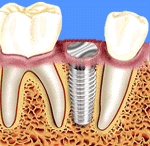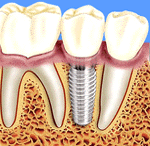|
Dental
Implants
The modern replacement for missing teeth
|
Dental implants are small titanium fixtures which are placed in the jaw
bone, after bonding, they serve as the root for replacement teeth. Dental
implants can be used to replace a single lost tooth or many missing teeth.
Since titanium is compatible with living tissues, your body accepts it
naturally. Dental implants are the best and most permanent way to replace
missing teeth.
top
- Permanent
tooth replacement.
- Stops bone shrinking.
- Better esthetics.
- More confidence.
- Eat easier and better.
- Smile without
reservation.
- Be healthier.
- Look younger.
|
top
Dental Implants are appropiate for almost anyone who is
missing teeth or at risk of loosing teeth because of cavities,
gum disease, accidents, etc.
- Individuals with loose or poor fitting dentures due to
flat ridges.
- Individuals with multiple missing teeth who need support
for crowns and bridges.
In such patients, normal eating and speaking habits are
affected and in many cases individuals are completely unable to
wear dentures. This loss of function is the primary reason
dental implants are recommended. Along with improving an
individual's ability to chew and enjoy food, dental implants can
make the patient feel more secure as speech and appearance are
often improved as well.
During the first appointment specialized diagnostic studies
are done to determine the ideal treatment for each person.
After careful evaluation of your health history, your dentist
will alert you to any conditions that may affect your treatment.
Remember, age is not a factor
top
Research and documented scientific studies have proven the
effectiveness and long lasting results (over 30 years) of dental
implants. If this treatment is provided by an experienced
implantologist, your implants could last a lifetime.
You can rely on your new teeth to look, feel and function
like natural teeth for years to come. Additionally there is no
need to cut down healthy teeth and dental implants keep the
bones from shrinking after loosing your theeth.
Dental implants have a survival rate of aproximately 99%. The
training and experience of the dentist also contribute to
overall survival rates.
top
No, Implants are made of biologically compatible materials
which have undergone extensive testing over a period of several
years. Since these materials are largely metals, such as
titanum, and have never been living tissue, there is no
likelihood of causing an antigen-antibody response which could
cause rejection similar to that which sometimes occurs with
heart and kidney transplants.
Dental implants are made of titanium metal which is the most
accepted metal in the human body.
In the unlikely event an implant fails it can usually be
replaced by a new implant.
top
 |
First Surgical
Phase (Implant Placement)
Under Local anesthetic the dentist places dental
implants into the jaw bone with a very precise surgical
procedure. The implant remains covered by gum tissue
while fusing to the jaw bone. |
Second Surgical
Phase (Implant Uncovery)
After approximately six months of healing. Under local
anesthetic, the implant root is exposed and a healing
post is placed over top of it so that the gum tissue
heals around the post. |

|
 |
Prosthetic
Phase (Teeth)
Once the gums have healed, an implant crown is
fabricated and screwed down to the implant. |
top
A) How long is the treatment ?
From a few months to a couple of years, it depends on the
simplicity or complexity of your dental-oral situation.
B) Will I have teeth all the
time ?
In some patients it is required to keep removable bridges
out for a few days. Some of the patients can have their
teeth all the time..
C) Is it painful ?
No, most patients report a little swelling, but no pain
at all. It is important to follow the post-operative
instructions for a fast healing.
D) Will I be off work ?
Most patients only require one or two days of rest. You
can continue with your life normally.
E) Is there a follow-up
appointment ?
Yes, to ensure you are healing fine without
complications.
F) Why dental implants became so
popular ?
As our lifespan increases, the need for some type of
permanent dental replacement system becomes very important
to our overall health. Dentures and removable bridges have
obvious problems: They are loose and unstable. Implants can
provide people with dental replacements that are both
functional and esthetic.
G) What if I have lost bone ?
With new bone grafting/regeneration almost anyone can be
a good candidate for treatment.
H) What is an artificial bone
substitute ?
Bone Grafting.- Sometimes, when resorption has
excessively reduced the jawbone, it can be rebuilt throught
modern bone grafting techniques. Bone grafts can build up or
fill in jawbone defects allowing the placement of dental
implants. These techniques represent one of the greatest
advances in modern dentistry.
Modern bone grafting techniques can be nothing short of a
miracle for those needing bone replacement. Should your
doctor recommend this treatment you will be given further
information on the type, location and amount of graft
needed.
I) Are implant supported teeth
as strong as my natural teeth ?
Yes. Research shows that in many cases implants are
actually stronger then natural teeth. Compared to removable
teeth, studies show implant supported teeth have 100 percent
or better chewing efficency. Dental implants can make it
possible for your to enjoy your favorite foods, improve your
nutrition and your appearance!
top
A) The cost of dental implants
The cost of implant treatment depends upon the number and
type of implants placed and the type of replacement teeth
needed. For example, replacement of a single tooth with
implant treatment costs about as much as a dental bridge.
The bridges necessitates "cutting down" adjacent
teeth for crowns. Implant treatment does not. More complex
treatment, such as bone grafting, will add to the cost.
The improvement in your self confidence, comfort, eating
habits and appeareance will make dental implant treatment
one of the best investments you've ever made!
The number of implants used for a given restoration is most
important in terms of the success of the restoration, not
the overall fee.
It is certainly much more cost effective when the same
dentist both places and restores a patient's dentition.
A survey of 350 patients after completion of their implant
treatment revealed that not only was it worth the
investment, but that they would happily do it again.
B) Is there a guarantee ?
Since there are health conditions and habits out of our
control, the treatment can't be guaranteed. The implant
manufacturer covers the implant for 10 years.
top
| ![]()